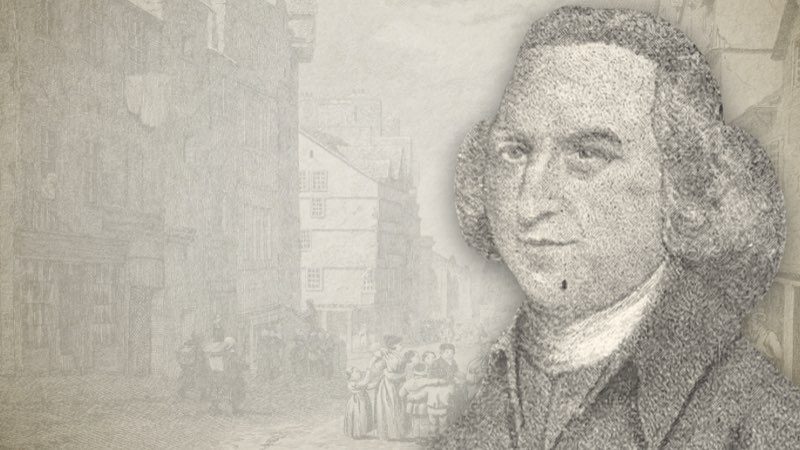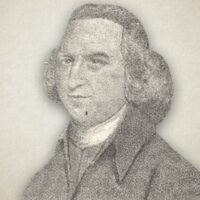
The Life And Ministry Of Richard Conyers
The Sower 1895:
The name that heads this short article is worthy of a place amongst our former Christian leaders, from his intimate acquaintance with such men as Berridge, Newton, Thornton, Romaine, and others. He was born at Helmsley, in Yorkshire, on February 13th, 1725. He was early deprived of both parents, and was brought up by his aged grandmother. He was first sent to school at Coxwold, and afterwards, at a suitable age, to Jesus College, Cambridge, where he was unwearied in his studies; and when still quite young, was appointed to a curacy at Overcarr, twelve miles from Helmsley, which he served for five years, when, on the death of the vicar of Helmsley, he was presented to that living. Like many others of his own time, and many still living, he entered upon these duties in a spirit of Pharasaic confidence, not knowing the way of salvation, and therefore unable as a true servant of God to point out the way to others. But the Lord mercifully did not leave him in that state to perish. His peace of mind became disturbed by reading Luke 6:26, “Woe unto you when all men speak well of you! for so did their fathers to the false prophets.” Convictions darted into his soul; these he tried to allay by greater resolutions to sanctity of life, fasting often, and at the communion table in his church signing covenants and vows with his own blood; but all in vain. While in this state of mind one day, reading the lesson from Ephesians 3, that Word made a deep impression upon his mind, “The unsearchable riches of Christ,” from which he was led by the Holy Spirit to reflect: “‘The unsearchable riches of Christ.’ I never found, I never knew that there were unsearchable riches in Him.” Deep convictions took hold of his mind, and he was brought into sore trouble. He felt he was not only wrong himself, but that he had also misguided the flock, to the great injury of their souls; and he could not help communicating to them his distress, telling them that he had brought himself and them into a condition from which he was unable to deliver them. At length the sorrowful sighing of the prisoner was heard, as it ever is, and ever will be, by a gracious prayer-hearing and prayer-answering God, and on December 25th, 1758 (the day on which the Rev. James Hervey died), while walking in his room, two precious portions of the Word were brought to his mind, ”Without shedding of blood there is no remission” (Heb. 9:22); ”The blood of Jesus Christ His Son cleanseth us from all sin”; by which the mists of ignorance were dissipated, and he was filled with ineffable joy. He says, “I went upstairs and down again, backwards and forwards in my room, clapping my hands for joy, and crying out, ‘I have found Him ‘ I have found Him whom my soul loveth,’ and for a little time, as the Apostle said whether in the body or out of it, I could hardly tell.”
The first time after this that his friends were assembled at his house, with true evangelical simplicity he informed them of what he had experienced, and concluded by attempting to convince them from Scripture that the blood of Christ could alone expiate their innumerable transgressions and produce real peace of mind, and that His righteousness alone could entitle them to the enjoyment of eternal life. Upon this occasion an aged man who was blind rose up, and with his furrowed cheeks bedewed with tears, and his arms wide extended, endeavoured to embrace him, as a token of his gratitude for the tidings he had heard and the pleasure he had received. On the ensuing Sabbath Day he spoke freely to his people of the way of salvation alone by the Lord Jesus, acknowledged that his principles had been erroneous, and that the doctrine he had laboured to establish among them was not the Gospel. He was soon called upon to suffer the reproach of the cross; many of his former friends began to treat him with contempt; but the Lord greatly blessed his labours. John Thornton soon heard of his excellent character and singular success, and paid him a visit, which friendship ultimately resulted in Dr. Conyers marrying Mrs. Knipe, a widow sister of Mr. Thornton’s. During the winter months this happy pair constantly provided clothes for the poor, and when scanty harvests seemed to threaten approaching want, purchased large quantities of corn, which they distributed at half the market price. Every Sabbath about thirty persons from distant parts were cared for at their hospitable board.
ln the year 1774 his dear partner was removed from him, to his own and his flock’s inexpressible grief, and about eighteen months after this event he also removed from Helmsley, being presented by Mr. Thornton to the vicarage of St. Paul’s, Deptford. It is impossible to describe the general sorrow which pervaded his parishioners when made acquainted with his determination. A traveller passing through the town, as he approached the market place, saw a great concourse of people in the bitterest lamentation he ever beheld; some were wringing their hands, and others, with tears streaming down their cheeks, appeared almost in a state of distraction. Inquiring into the cause, he was given to understand that it was on account of the loss they were likely to sustain in the loss of their minister, many of them declaring that they would lay themselves along the road, and if he was determined to leave them, his carriage should drive over them. To avoid any confusion he left the place in the dead of night.
Good John Berridge did not approve of this step, and, in one of his letters to Mr. Thornton, says: ”It was a matter of surprise to him how Dr. Conyers could leave his beloved flock at Helmsley, and also how Mr. Thornton could present him to Deptford,” and thus concludes: “You may give me a box on the ear for thus speaking, if you please, and I will take it kindly, and still love and pray for you.” Though the step seemed a strange one to many of his friends, yet the Lord owned and blessed his labours here also.
After preaching at Deptford for ten years (and he was mostly at home, as he did not like fresh pulpits), he felt that his end was drawing near. To a friend who called to see him he said, “I shall not be here long; this will be the last time I shall see you; we must be in Christ Jesus or nothing at all.” During all this week he repeatedly said, “I find my Jesus so precious to my soul that I cannot express it, I am so happy in the things of God. I am so wrapped up in Jesus that I am confident I shall not stay here long;” though his health appeared to others as usual. On the Sabbath he went to church. In his comment on the twentieth chapter of Acts he called upon his people solemnly to witness that he was clear of their blood. In his discourse, which he preached from Matthew 28:18, “All power is given unto Me in heaven and in earth,” he largely and sweetly dwelt on the Godhead and satisfaction of Jesus Christ, adoring the grace that had enabled him to preach, and directing the people to remember that Christ lived, and that all their happiness for time and eternity was treasured up in Him. In pronouncing the blessing his speech faltered, and he said, “I cannot get from my knees.” His servant raised him up, but he was quite helpless. His crowded audience were instantly thrown into shrieks and tears. As he was carried along the aisle to his house, he waved his hand to the people with a smile, bidding them a final farewell, saying, “I have no pain; God’s will be done. I hope I shall soon be with Jesus”; and at four o’clock in the afternoon his soul took its triumphant flight to everlasting glory, on Lord’s Day, April 23rd, 1786.
The Rev. John Newton, of St. Mary Woolnoth, preached his funeral sermon, from 1 Thessalonians 2:8, which was afterwards published. A long epitaph on his tombstone describes his excellency, his hopes, &c., concluding with this verse:—
“Sent by the Lord on purposes of grace,
Thus angels do His will and see His face;
With outspread wings they stand, prepared to soar,
Declare their message, and are seen no more.”
Richard Conyers (1725-1786) was a High-Calvinist Anglican preacher. In 1756, he was appointed rector of Church of All Saints, Helmsley; in 1763, he was appointed rector of Kirby Misperton; in 1775, he was brought to London where he served at St. Paul’s, Deptford.



